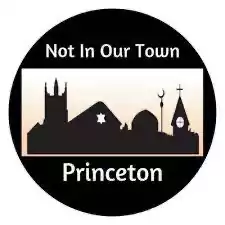
To extend our community outreach, the library partners with the many municipal, non-profit, and business organizations that make Princeton such an extraordinary town. This month, we spoke with Linda Oppenheim, board member of Not In Our Town Princeton.
Not In Our Town Princeton and Princeton Public Library have been longtime partners with a shared mission of helping our community develop racial literacy. Our longest ongoing partnership has been the meeting that happens on the first Monday of every month, Continuing Conversations on Race and White Privilege. The program, a presentation followed by small group discussions, regularly attracts 70 or more people and sometimes well over 100. Participants are particularly grateful for the opportunity to speak about sometimes challenging or uncomfortable topics together in a welcoming space.
How long has Not in Our Town Princeton been in Princeton?
In 1998, representatives from four Princeton faith communities met to discuss problems of racial injustice in the Princeton community. In 1999, invitations were extended to other faith communities, and congregational representatives comprised the Not in Our Town Princeton (NIOT) membership for a number of years. They also adopted the name Not in Our Town, after a group in Billings, Montana united its community under that name to deal with several bias crimes. In 2015, NIOT revised the criteria for board membership and dropped the requirement for members to represent a faith community.
What is your primary area of focus?
Since its inception, Not in Our Town Princeton’s primary focus has been racial justice — racial equity community education and advocacy.
Why do you like partnering with the library?
The Princeton Public Library has been one of NIOT’s strongest partners. We’ve collaborated on many programs over the years, in particular our monthly Continuing Conversation on Race and White Privilege. The library staff has been beyond helpful with publicity and production. The building is a beautiful site to hold programs, and the technological support we’ve received during the pandemic has been critical to continuing our community education.
With whom do you work most in the community?
In addition to the library, we have worked with the Princeton Civil Rights Commission, the Princeton YWCA, Princeton University’s Carl Fields Center, and local faith communities’ racial justice committees. We have strong ties to the Princeton Public School system, meeting regularly with the superintendent and advocating for and participating in racial equity and literacy efforts. Not in Our Town began by giving Princeton middle school and high school students recommended by their teachers and/or counselors our Unity Award for students “ who best exemplify the values expressed in the NIOT mission statement.”
What is something that you do that people might not know about?
People might not know about the behind-the-scenes racial justice advocacy work we do, particularly with the Princeton Public Schools. They might not know that we offer to organizations, free of charge, a two-part workshop called “Examining Racism: Looking Inward First.” They also probably don’t know that our board members recognize and support each other as we continue to work on our own biases and educate ourselves about racial history that by in large was ignored in school curricula. We allot time at each board meeting for personal testimonies about white supremacy —incidents witnessed or directed at us or even what we ourselves have committed.
Is there any project or event that you are particularly excited about at the moment?
In 2020, we expanded our Youth Advisers to add 10 Princeton High School students, who are passionate about racial justice. Two of them have already presented at our monthly Continuing Conversation. We’re looking forward to the projects they will undertake. Upcoming, we’re working with the Witherspoon Street Presbyterian Church, Nassau Presbyterian Church and PPL to organize a diverse, multi-generational, multi-racial group of speakers to deliver the Frederick Douglass July 4th Speech on Monday, July 5, preceding the NIOT Continuing Conversation that evening.
